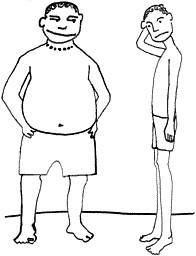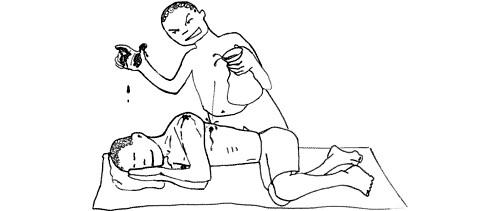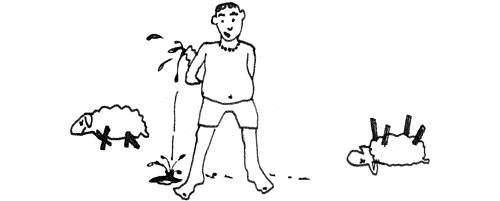
There was a woman who lived in a village near the end of the land. This woman had two sons, one called Diepe and the other Diepetsana. They were very poor people and they did not have a great deal to eat. Their granary was never more than half full and they wore very shabby clothes. Sometimes they had no clothes at all, and had to wear old rags and leaves to preserve their modesty. It was not easy being that poor.

In the same village there was a young man called Dimo. He was not as poor as these other two, as he had married the daughter of a rich man. He had everything that he needed in this life, including a great deal of food. This food, which was rich and good, had made him quite fat.
This Dimo asked Diepe whether he could come and help him at the cattle post of his wife’s parents. There was much to be done there, he said, and they would be looked after well. Because he was poor and had nothing else to do, Diepe agreed to accompany Dimo to this place, which was very far away, and on the edge of the place where nobody lived but only wild animals.

During their first evening at the cattle post, Dimo’s wife brought water to the hut to wash the hands of the men before they had food. Dimo asked Diepe whose food he would be eating and said that because it belonged to the parents of his wife, it was not right that Diepe should eat it. So Diepe went to bed without any food and his stomach was empty and painful within him.

That night, Dimo went outside and killed some sheep which were in a stockade. Then he took the blood of the sheep and put it in a calabash. Back in the hut, while Diepe was fast asleep, Dimo put the sheep blood all over the sleeping man’s face. The next morning, when the parents of Dimo’s wife went out to look at their animals they found that the sheep had all been killed.

“Who has done this wicked thing?” they asked.
Dimo pointed at Diepe, and said, “His face is covered with sheep blood. Look! That is the person who has done this wicked thing.”
The parents then said that Diepe should be killed for having done this, and that happened that afternoon. Dimo was pleased, and when he went back to the place where Diepe’s brother lived, he told Diepe’s mother that her son was being well looked after in that other place and that now he had come to take Diepetsana to join him. Dietpetsana was very pleased to go with Dimo, although he could tell that there was something wrong. Diepetsana was a traditional doctor and would be very good at sensing such things when he was older. But even now he could tell that there was something wicked planned, and he took with him two very important fly whisks that were good for all sorts of tasks.

They reached the cattle post and Diepetsana saw that there was no sign of his brother. That night he slept in a hut, but before he lay down he set up the fly whisks so that they would see if anybody came in at night. One was placed at the foot of his sleeping mat and another at the top.

In the depths of the night the fly whisk at the top of the sleeping mat sang out: “Who is this entering?”
And the reply came from the fly whisk at the bottom of the sleeping mat: “Isn’t it Dimo?”
“What does he have on his hand?” sang the top fly whisk.
And the bottom fly whisk sang “Isn’t it blood?”
Dimo was very frightened when this happened and he withdrew from the hut. A few minutes later he Plucked up the courage to enter again, and the same thing happened. And so it went on until the morning, when the parents of Dimo’s wife awoke to find their son-in-law outside the hut with a large gourd of sheep’s blood and the sheep all dead upon the ground.

They were very angry and killed Dimo on the spot. They were pleased with Diepetsana, though, and they rewarded him handsomely. He was now a rich man and he looked after his mother well, so that she was no longer poor. Their life had changed, although they still felt sad for the loss of Diepe and thought often of their brother and son who had now gone.
